

SLJ’s Top 10 Tech Trends for 2013. Flexibility and personalized education: That’s what the learners of 2014 will expect from their libraries.
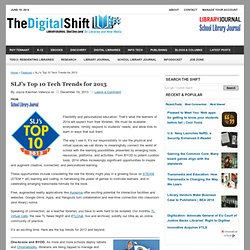
We must be available everywhere, nimbly respond to students’ needs, and allow kids to learn in ways that suit them. The way I see it, it’s our responsibility to use the physical and virtual spaces we call library to meaningfully connect the world of school with the learning possibilities presented by emerging tools, resources, platforms, and activities. From BYOD to potent curation tools, 2014 offers increasingly significant opportunities to inspire and augment creative, connected, and personalized learning.
These opportunities include considering the role the library might play in a growing focus on STEAM (STEM + art) learning and coding, in harnessing the power of games to motivate learners, and in celebrating emerging transmedia formats for the book. Free, augmented reality applications like Aurasma offer exciting potential for interactive facilities and websites. Manifesto for 21st Century Teacher Librarians. Editor’s Note: This article was originally published as a Tag Team Tech column on www.voyamagazine.com.
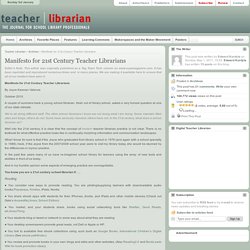
It has been reprinted and reproduced numerous times and in many places. We are making it available here to ensure that all of our readers have seen it. Manifesto for 21st Century Teacher Librarians By Joyce Kasman Valenza October 2010 A couple of summers back a young school librarian, fresh out of library school, asked a very honest question at one of our state retreats: We’re all doing different stuff.
Well into the 21st century, it is clear that the concept of modern teacher librarian practice is not clear. 5 Principles for New Librarianship. Do you ever feel like making innovative changes in your library is equivalent to pushing a giant boulder up the hill? Been there, done that, could write a book on it! Change is upon us though, despite those who relish the “old ways” of doing things. A "Commons" Experience: Five Benefits of the Information Commons.
In "The Comedy of the Commons," Dr.
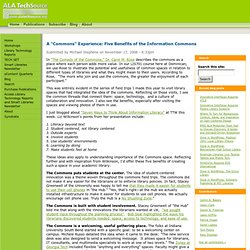
Carol M. Rose describes the commons as a place where each person adds more value. In our LIS701 course here at Dominican, we use Rose to illustrate the potential and usefulness of common spaces in relation to different types of libraries and what they might mean to their users. According to Rose, "The more who join and use the commons, the greater the enjoyment of each participant.
" This was entirely evident in the series of field trips I made this year to visit library spaces that had integrated the idea of the commons. I just blogged about "Seven Ways to Think About Information Literacy" at TTW this week. 1. These ideas also apply to understanding importance of the Commons space. The Commons puts students at the center.
The Commons is built with student involvement. 12 virtual learning commons. Toward a Learning Commons. School Library Monthly/Volume XXVIII, Number 1/September-October Toward a Learning Commons by Pamela Harland Pamela C.

Harland is currently the librarian at Sanborn Regional High School in Kingston (NH). She recently published The Learning Commons: Seven Simple Steps to Transforming Your Library ISBN: 1598845179 (Libraries Unlimited, an imprint of ABC-CLIO, 2011). Media Literacy and Learning Commons in the Digital Age: Toward a Knowledge Model for Successful Integration into the 21st Century School Library. By Paul Mihailidis, Ph.D, Assistant Professor, Emerson College and Director, Salzburg Academy on Media and Global Change School libraries today feel increasing pressure to reinvent themselves in the face of increasing financial pressures, new media technologies, and a progressively media-savvy population.
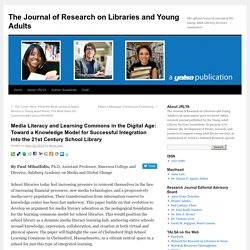
Their transformation from information reserve to knowledge center has been fast underway. This paper builds on that evolution to develop an argument for media literacy education as the pedagogical foundation for the learning commons model for school libraries. This would position the school library as a dynamic media literacy learning hub, anchoring entire schools around knowledge, expression, collaboration, and creation in both virtual and physical spaces. Flip This Library: School Libraries Need a Revolution. School libraries need a revolution, not evolution By David Loertscher One of the biggest business battles of our time is between Microsoft and Google.
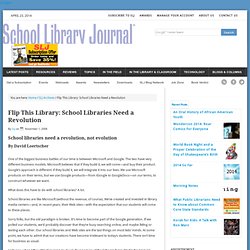
The two have very different business models. Libraries and Museums Become Hands-On Learning Labs. Culture Teaching Strategies YOUmedia Earlier this month, we covered the Fayetteville Free Library‘s new Fab Lab, the public library’s plans to build a “makerspace” where library patrons could gain hands-on experience using 3D printers and other tools and could take programming and “shop” classes.
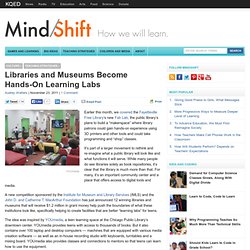
It’s part of a larger movement to rethink and re-imagine what a public library will look like and what functions it will serve. While many people do see libraries solely as book repositories, it’s clear that the library is much more than that. For many, it’s an important community center and a place that offers access to digital tools and media. A new competition sponsored by the Institute for Museum and Library Services (IMLS) and the John D. and Catherine T. The idea was inspired by YOUmedia, a teen learning space at the Chicago Public Library’s downtown center.
New teen learning labs will be built in San Francisco, CA; Thornton, CO; Columbia, MD; St. The St. Related. Learningcommons. Developing an Elementary School Learning Commons physical space. Net.educause.edu/ir/library/pdf/eli7071.pdf. Together We Can. School Librarian + Technology Specialist. A blog about instructional design and technology in libraries.